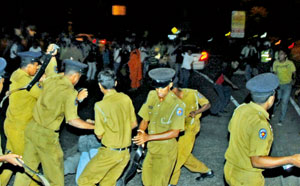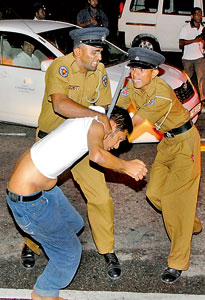The seemingly excessive use of force at Katunayake has contributed to a further erosion of public faith in the police. Its image in recent years has declined drastically against a backdrop of blunders in handling lawlessness as well as numerous instances of partiality in the enforcement of the rule of law. Arguably the police role and their responsibilities can be considered extremely challenging in the current environment fraught with considerable pressures and interferences.
In the combat of crime, vice and lawlessness, collision and conflict with the establishment could occur frequently. This however is not a new phenomenon, although their regularity may have been less in earlier times than now. The reputation and prestige of the police was infinitely superior in the bygone era for yet another reason: the quality of leadership in earlier times differed from that on display by the recent incumbents.
In any sphere of organized activity, be it a public service, a political party or even sport, leadership plays a crucial role in advancing the goals of that particular body. From the perspective of the police, its leaders, chiefly the Inspector General of Police, have to lay down policies and guidelines for their subordinates, who subject to exception should perform their duties within such a framework.
The leaders have to display considerable resilience, a commitment to the policies and guidelines laid down, and willingness to stand by and support their subordinates in carrying out their legitimate, unbiased duties.
 |
| File photo: Police attack campus students protesting at the Town Hall in Colombo |
It is in this respect that police leaders appear to fail today with monotonous regularity. They abandon their subordinates who face embarrassment or persecution for working according to the police code so frequently that the rank and file today feel they are left with no option but to resort to their own devices and stratagems to survive, and even to prosper at the expense of the kind and quality of service they have to render to society.
They perceive the superiors as being obsessed with the seats they enjoy and are therefore incapable of representing the truth to the establishment when threatened with persecution for acting correctly. Bereft of leadership, many subordinates act independently and in a manner which impairs the image of the police. The decisive point is that the holder of the apex position in the service should be a strong leader. Their lack appears to be a concern in the service. There may be seniors with suitable criteria to lead effectively. However if they are unable to reach the top, not only would they be incapable of giving full expression to their talents and abilities, but the service too would be starved of the fortune to exploit their full potential.
No less a person than the legendary Sidney De Soyza who left his clear imprint on the police once said. “There are no bad men, only bad leaders”. I was witness to former IGP Cyril Herath when he met General Sepala Attygalle, Defence Secretary to submit his resignation on a matter of principle and responding to the general’s proposal that he could be offered a diplomatic post, “Sir I am not submitting my papers to canvass to be an ambassador”. K.D.C Ekanayake who retired as Senior Superintendent of Police stood by his convictions. It did not matter to him whether he would perish in the process. WB Rajaguru, regardless of consequences, offered shelter and protection to senior officers who were being persecuted for all the wrong reasons.
There were lesser mortals in the police who were no less resilient. PL Munidasa , SBW De Silva, Lakshman Jayawardena, HG Gunawardena,Nalin Delgoda, Lionel Karunasena come to mind as some of them. Not only did they display courage in voicing their convictions, but also sought to resist interferences which could embarrass the reputation of the service.
The IGP leads a large body of policemen and is therefore constantly in their gaze. His relationship to his subordinates is somewhat analogous to that of a parent to his children. If the subordinates err or fall out of step, the IGP and his deputies have to discipline them: and if they act correctly and impartially, should be protected from persecution. If he fails to stand up for those who act correctly, would be considered a weakling by the subordinates and as one who is more concerned with preserving his position and privileges. His esteem in the eyes of the public will also suffer, for the media would rightly highlight all instances of controversial police conduct and actions. The IGP has to be perceived within the Service and without as an officer who does not seek material benefits, or entrenchment in his seat of office at any cost. If he acts to the contrary, would forfeit his freedom and independence to disagree or say “no” to unreasonable requests.
Although there is a general perception that politics interferes with the service, it would not be wrong to state that many police officers, particularly at the senior level have wooed politicians in a bid to entrench themselves in their positions, or to seek favours. This trend has become so pervasive today that the rank and file have lost confidence in the ability of the police hierarchy to defend them from persecution for the mere execution of their duties as required by the law.
What impelled the writer to put pen to paper was the announced retirement of IGP Mahinda Balasuriya and its aftermath in baffling circumstances. The first impression was that he had been given marching orders following the Katunayake fiasco, and this may not be apocryphal. But with the passage of time, he has sought to give the impression that he had retired voluntarily in the pursuit of a principle. If he genuinely felt he should depart for police excesses at Katunayake, the more appropriate time would have been after the commission conducting a probe presented findings to the President.
He has now brought things to a head by issuing a notice to the print media setting out reasons for his retirement, advertising whatever he thinks he has achieved in the service, and extending a profusion of thanks to the whole country (see box). He could only embarrass those who had been and are yet in service, for what he has done is not only unprecedented, but also incredulous.
Ranks in the service yet question the sudden inflation of the cadre of Deputy Inspectors General from less than twenty to forty by President Wijethunga where the unique beneficiary was Balasuriya who was the Chief Security Officer of the President at the time. The DIG cadre increase helped the entry of Balasuriya to the DIG fold, being virtually the last superintendent in the line of seniority to benefit by the inflation. This promotion was considered more than a coincidence, police circles perceiving that the huge inflation in the cadre of DIGs was redundant at the time.
Many ingredients constitute leadership in the police; courage to act by one’s conscience and convictions, a sense of justice and fair play, commitment to the rule of law without which there may be a reluctance to eschew material benefits, and an ability to ensure that the service functions efficiently. A sense of loyalty to subordinates as well as a profound knowledge and abundant experience of police work should also be in the armour of a good leader. “Leading from the front” is a maxim in vogue in the armed services, and is certainly apt for the police service as well.
The service has had its share of stalwarts: Rudra Rajasingham , Cyril Herath, S. S. Joseph, V. Vamadevan, Leo Perera, K. D. C. Ekanayake, M. Shanmugam, Lionel Karunasena , W. B. Rajaguru, A. S. Seneviratne, Achilles Joseph. Their inspiration perhaps was Sidney De Soyza, an icon whose afterglow the service yet savours. The retirement of Rajaguru may well have been a watershed, when assessing the declining standards in the highest echelons. From an embarrassment of riches, the service has declined to a paucity of leaders.
Seeing the evident decline in the quality of leadership in the police, it is tempting to look for the reasons. The ingredients or recipe for leadership discussed can be acquired only if graduates who join the police and are therefore ideally placed to reach the highest stakes commence their careers as Sub Inspectors, not Assistant Superintendents. Some of the ingredients in the recipe, particularly knowledge and experience in handling testing situations, and even awareness of difficulties experienced by subordinates can only be cultivated by experiencing the trials and tribulations faced by the inspectorate. An accelerated promotion scheme could compensate for starting at the bottom.
Those with academic backgrounds can then emerge as mature leaders, rather than being consigned to merely holding post-mortems and being dogmatic about situations they had not handled nor experienced. If the prevailing system is failing to turn out effective leaders, the time is appropriate to suspend it and examine how the probationary “ASP” system can be reviewed and revamped so as to arrest the currently evident decline.
The creation of a police commission at one time also has had its drawbacks. It was intended to ensure that the service functions ideally within an established framework. But then it also stands to drastically circumscribe the authority of the head of the service. If the crying need of the police is to enjoy strong and effective leaders it may be incongruous to employ a system which will reduce the IGP to a figurehead. Alternate checks and balances may have to be explored to marginalize police iniquities.
A point of view which is current is that strong leadership cannot be exercised today, that times are different. There may be a way out of such an impasse. If those occupying the highest echelons in the police can steer aggressive policing programmes, and demonstrate a modicum of altruism to subordinates, governments are likely to respect and appreciate the capacity of the service to deliver.
It is against such a backcloth that a meaningful dialogue between a government and the leadership of the police can be constructed, one where the government will give serious consideration to the representations of the senior officers in respect of police actions and conduct.
The writer is a Senior Deputy Inspector General of Police (retired)
Reasons for retirement
A number of points of interest can be gleaned from his retirement letter made public. First, no previous IGP has ever resorted to such a step. Second, if he had to explain why he retired, it should have been to the Defence establishment, not to the public. Third, not a single service chief, head of a department or secretary of a ministry has ever, or is likely to go public in the manner done by Balasuriya. Fourth his shifting the blame for the Katunayake debacle to his subordinates tempts a repetition of what Sidney De Soyza said “There are no bad men, only bad leaders”.
It may not be correct from a leadership perspective for leaders to take full credit for the good work of subordinates whilst consigning them to the wolves when things go awry. This trend of deserting the subordinates is now becoming frightfully tendentious in the service in the absence of loyalty downwards. Fifthly, it may not have been correct for the former IGP to have censured his subordinates in the face of the ongoing commission of inquiry. Sixth, the release of a bulletin at the end of a career may be the exclusive privilege of one who earns national acclaim for an outstanding contribution. Balasuriya would not fall into such a category. |



